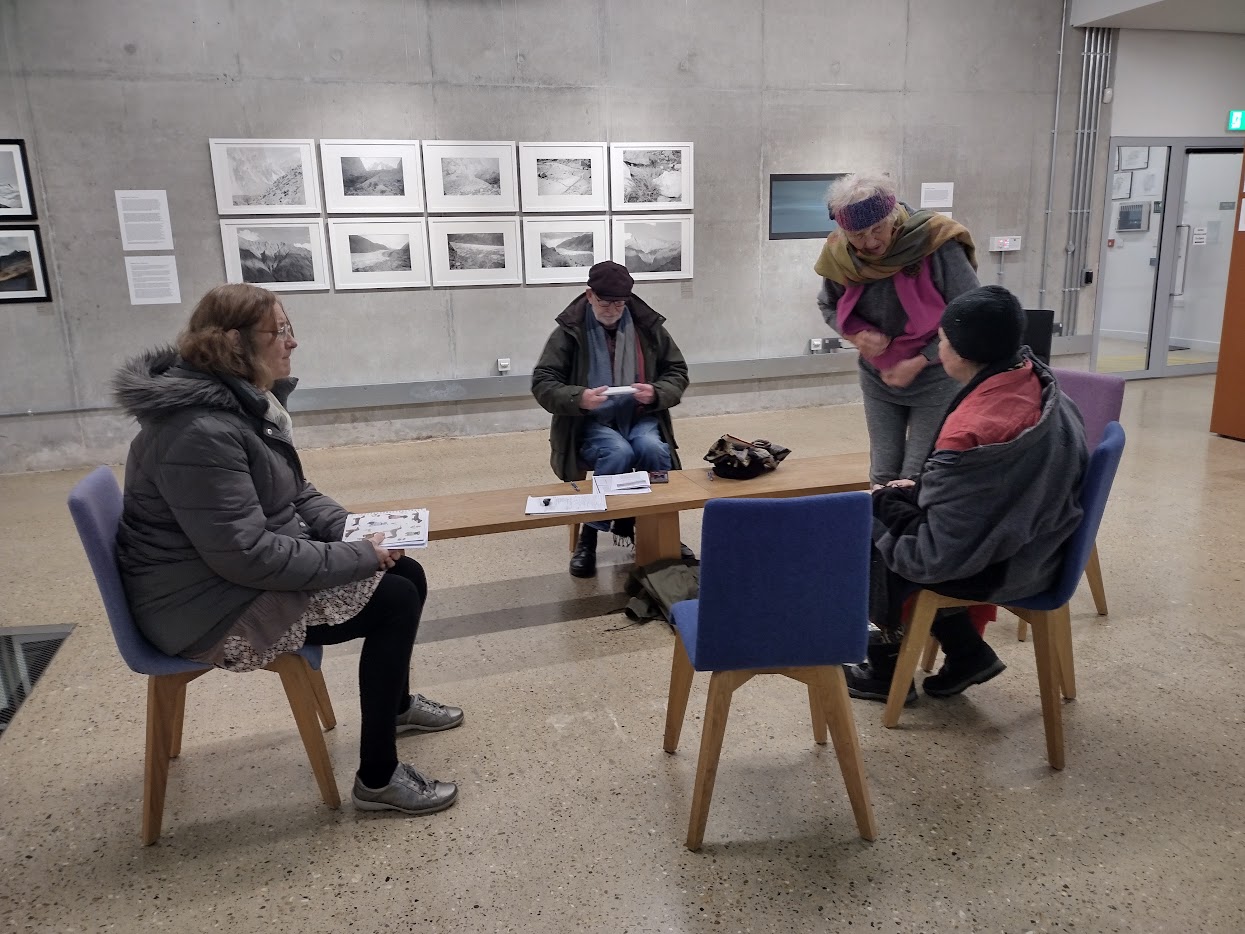Victoria Field
Oh, science, with your tricks and alchemies … (from ‘Glacier’ by Gillian Clarke, in her collection, ‘Ice Age’)
In the future, glaciers will be an alien phenomenon, rare as a Bengal tiger; having lived in the time of the white giants, will become swaddled in a fairy-tale glow, like having stroked a dragon or handled the eggs of the great auk. (from ‘On Time and Water’ by Andri Snær Magnason, trans Lytton Smith, p.183)
Appropriately, it was a freezing afternoon, Tuesday 9th January 2024, when seven writers gathered in the Daphne Oram Gallery for an afternoon responding to the rich and varied exhibition, Glacial Movements and the Ghaib. This multimedia show by members of Lumen Studios and Pak Khawateen Painting Club, two all-female artist collectives, explores the history and politics of water, and focuses on their expedition to the largest glaciers in Pakistan. Read more here: https://www.canterbury.ac.uk/events/2023/glacial-movements-and-the-ghaib
Art, including poetry, takes us into ourselves and out of ourselves. It’s a powerful way of forging connection, with our individual psyches, each other, and the world. For me, that’s both the material world, and the immaterial world of the numinous and the divine. Many of us walk too quickly through art galleries and exhibitions, and possibly life in general. There is now an initiative encouraging ‘slow looking’ (you can google this), as a more mindful way of experiencing visual art. We began our exploration of Glacial Movements and Ghaib with slow looking, selecting an art work to engage with for a full five to ten minutes.
We then read a number of texts relating to glaciers. These included technical explanations, the rich geological vocabulary of glaciers, with words such as kettles and kames, crevasses and corries. Consideration of deep time can be mind-boggling; that our current ice age began 34 million years ago in Antarctica, that ice-sheets in North America formed 2.6 million years ago and the most recent period of glacial retreat began 11,700 years ago. Alpine glaciers, that is those on mountains, as in Pakistan in this show, are highly sensitive to climate change. They retreat and grow quickly, with sometimes devastating effects on the local environment.
We explored literary responses to glaciers. Andri Snær Magnason’s book ‘On Time and Water’ translated by Lytton Smith, is a lament for the glaciers of Iceland and the Himalayas. He describes them as ‘frozen manuscripts that tell stories, just like tree circles and sedimentary deposits’ (p.179). We read poems by Gillian Clarke, Robert Frost and Amy Gerstler. We also looked at ‘Rise’, a poetic cry for respect for ‘life in all its forms’ by two young women poet-activists, Aka Niviana from Greenland and Kathy Jetnil-Kijiner, a Marshall-Islander, both of whom are witnessing the catastrophe of climate change first hand. You can read more about them here: https://www.theguardian.com/environment/2018/sep/12/high-ice-hard-truth-a-poetry-expedition-to-greenlands-melting-glaciers-bill-mckibben . Finally, we explored Robert Macfarlane’s glossary of words related to ice, collected from around the British Isles. Dialect words and lesser-used languages are as at risk of extinction as other creatures. In his book of glossaries of the natural world, ‘Landmarks’, Macfarlane writes that ‘to use language well, is to use it particularly: precision of utterance as both a form of lyricism and a species of attention’ (p.11).
Reading the words of others, especially in a group, opens an imaginative space in which our own words rise to the surface and ask to be heard. We returned to the exhibition and wrote our poems in response to these generous artists. Some follow here. These are shared with permission of the writers. Poems, I believe, are a way of loving the world, and we will only defend what we actively love.
Wise Words for the Earth is an initiative by geologist Helen Nattrass, and writer and poetry therapist, Victoria Field, bringing together writing for wellbeing and deep ecology to enhance connections, with each other, with our own selves and the world we call home. It includes workshops and talks in the Canterbury Festival, and ad hoc gatherings like the one described above.
Wise Words for Wellbeing has been meeting in Canterbury Library for over a decade, weekly on Fridays, 2pm-4pm, in the Community Room at the Beaney. It’s a public, open access group where everyone is welcome to engage in expressive writing and explore poems. No experience nor booking necessary.
For more on Geopoetry see the Scottish Centre for Geopoetics https://www.geopoetics.org.uk/ and a forthcoming conference on Geology and the Arts at The Geological Society in September 2024 https://www.geolsoc.org.uk/07-Earths-Canvas
#geopoetry #sustainablity #writingforwellbeing #poetrytherapy #helennattrass #victoriafield #thepoetrypractice
 Arts and culture
Arts and culture Paul Russell
Paul Russell 1080
1080



A thoroughly enjoyable afternoon with interesting information given through science, geology and literature as well as close study of the artwork in the exhibition- all of which was inspirational. The resultant poetry was impressive and, although very individual and personal, showed a common theme of humanity surviving, or not, along with the geological world.